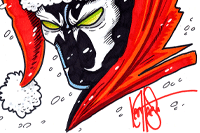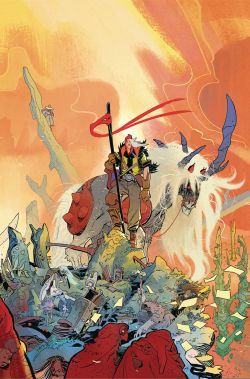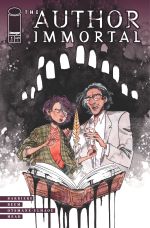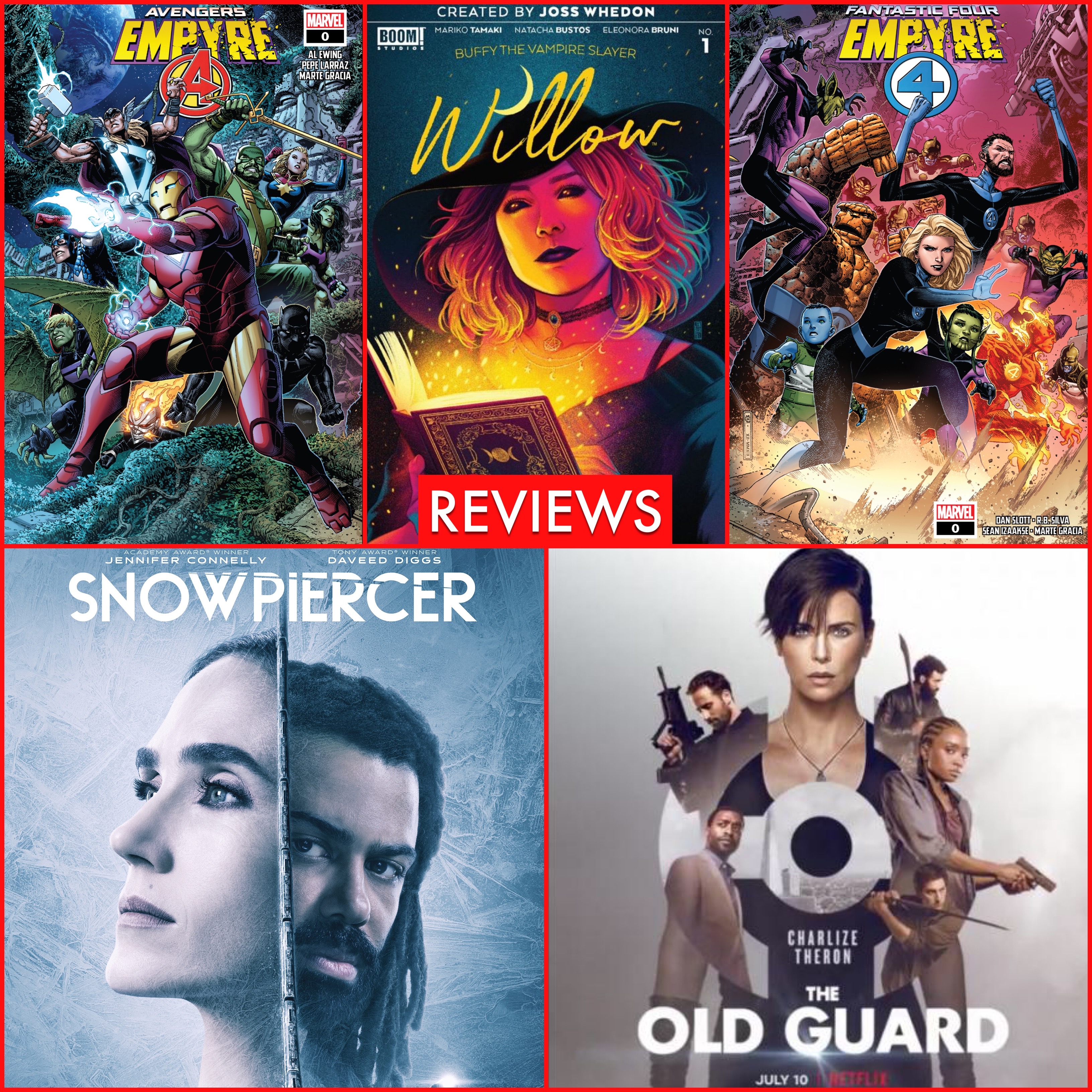SIMON SPURRIER
 SEND THIS TO A FRIEND! SEND THIS TO A FRIEND!
DF Interview: Simon Spurrier battles the cliches of sword & sorcery in the broken fantasy world of Coda By Byron Brewer From Eisner-nominated writer Simon Spurrier (The Spire, Godshaper) and artist Matías Bergara (Cannibal, Supergirl) comes the broken fantasy world of Coda. In the aftermath of an apocalypse which wiped out nearly all magic from a once-wondrous fantasy world, an anti-social former bard named Hum seeks a way to save the soul of his wife with nothing but a foul-tempered mutant unicorn and his wits to protect him…but is unwillingly drawn into a brutal power struggle which will decide forever who rules the weird wasteland. DF wanted to get the full 411 for you, so we sat down for a chat with scribe Simon Spurrier. Dynamic Forces: Simon, tell us the impetus behind this great new 12-issue series from BOOM! Studios. Simon Spurrier: It started from an abstract intention to -- sooner or later -- do a sword & sorcery epic. One of those bucket list things, you know? But in practice every time I tried to approach it as a viable project, I found myself getting demoralized. There’s just so much existing high fantasy material out there, and -- sorry -- the vast majority of it is appallingly bad. There are endless cliches clogging up the whole genre, and most of it takes itself waaaay too seriously. It felt like I couldn’t start without first tripping up on elements overused elsewhere. Eventually I realized if I was going to do anything in that oeuvre at all, the kindest starting point would be to drag the whole heroic but tragically abused genre outside and shoot it. So that’s kind of where Coda came from. I started by identifying everything about high fantasy which irritates me, and I murdered it. That ranges from my own minor grievances (the pomposity, the ridiculous names, the casual racism, the ham-fisted metaphors) right up to the single greatest genre element in there: Magic. In far too many fantasy stories, magic is this deus ex machina force which triggers plot elements without cost or repercussion. It’s a Get Out Of Jail Free card, and that’s led to the whole genre getting flabby and lazy. So I got rid of all the magic. Well, not all. The better analogy would be that magic is to Coda as gasoline is to Mad Max. As in: you can’t rely on it any more. The Old World depended on it utterly, and now that’s not an option. So either you get busy trying to survive without it, or you spend your time fighting over what little remains. In Coda, both things are very much on the table. So, yeah. This is a broken fantasy. A post apocalyptic tale, in a way, but don’t expect bleak and parched wastelands: this is a world full of life. Anyway, the first thing I discovered when I approached fantasy with euthanasia in mind was that a whole new world of vibrancy and opportunity opens up when you make a step change like that. DF: What can you tell us of the world you and artist Matías Bergara are trying to create? Certainly something very different than the norm, it would seem. Simon Spurrier: Absolutely, yeah. I think the biggest factor is that nothing is easy in this world. A lack of universal magic means that nothing comes for free, so everything’s a struggle. What you quickly discover is that when the whole world has had its metaphorical crutch kicked out from under its feet, all the big stuff which we usually associate with sword & sorcery -- Quests! Court intrigue! Kingdoms at war! Monster slaying! -- is immediately revealed as being thoroughly irrelevant. Instead everybody is forced to think in far smaller, hence far more human, terms. Day-to-day survival, friendship and love. Which is perfect, because as a writer I’m far more interested in what characters do inside the world I’ve created than I am in the world itself. Anything else is just high-concept snakeoil. I guess at the crux of Coda is a question about whether our various characters will define themselves according to what they were in the old world, or who they are in the new. That gives us access to a bunch of quite dark comedy -- once a bloody paladin, always a bloody paladin -- but also some very focused emotional plot engines. Despite the enormous scale of the world we’ve built, and the incredible players within it, Coda is primarily a story about one man who’s desperately in love, trying to figure out what to do about it. DF: What is the general storyline for this “relentless kaleidoscope of visual wonders and worries”? Simon Spurrier: The central thrust concerns Hum, our curmudgeonly protagonist, trying to save the woman he loves. So far so Damsel In Distress, right? Well, that’s where the cliche starts and stops. See, Hum’s being a bit vague about exactly what’s happened to her. She seems to have been captured by a group of savage orcs out in the desert… but whereas Hum has a pretty good idea of how to save her, getting his plan up and running requires far more resources than he’s able to scavenge together. And there’s definitely a lot he’s not saying. So this is one of those hoary, familiar old “quest” threads which we’re using to ease readers into the world -- only to flip the tables completely. Nothing is quite what it seems. Anyway, the meat of the story revolves around the sh*t that Hum gets himself tangled-up in while following that central goal. With all the subtlety of a mutant minotaur in a china-shop, he blunders into the midst of a power struggle between several major players in this weird new world. On one hand, a town of survivors with an invaluable treasure; on the other, an itinerant group of bandits -- led by the last surviving giant -- and between them our hero’s old friend and ally, the Murkrone: a traveling merchant with links to all sides. Before long, Hum is enmeshed in sneaky schemes and attempted crimes, with pretty much everyone blaming him for everything. DF: What more can you tell us about Hum? What challenges face him immediately as the series gets under way? Simon Spurrier: I’ve taken to calling him “a lonely misanthrope.” As in: he really struggles to be around other people -- they’re untrustworthy, treacherous and frankly annoying -- but he can’t bear to be on his own for too long either. This particular dichotomy gets worse all the time. He has two comforts. The first is the Nag, his reliable but insane mutant unicorn. (Well, technically a Pentacorn.) See, Hum is disabled -- one of his legs is missing from just below the knee -- so having a formidable vehicle, for fighting as well as running away, is super vital. As far as cute animal sidekicks go, the Nag belongs very firmly in the “playful psychopath” niche. The other comfort is Serka, his wife. The one and only person he’s ever met with whom he could happily spend all his time. And now she’s gone. I think it’s fair to say he’s built her up to this -- frankly unhealthy -- pedestalled position in his mind. He thinks it’ll solve everything by getting her back, and he is of course fooling himself about that. In the meantime – whenever he’s not riding or fighting or scheming for his life -- Hum’s grouchy observations tend to veer toward class. In the Old World, he was a bard who made his living writing overblown sagas about his various patrons: knights, lords and wizards. Pretty much all braggarts and out-of-touch assholes. As a result, he has a healthy disdain for any group still trying to cling to the social structures of the old order, and reserves a special revulsion for any boastful overclass which still think of itself as superior. Knights -- and in fact any use of the word “quest” -- come in for particular hatred. What’s particularly lovely about Hum is that despite being a taciturn man of few words he has this deep wellspring of thoughts and feelings he’s compelled to share. His means of doing so is to keep a diary -- or, rather, to write unsendable letters to his missing wife. So we have these two very different sides of the man: one stoic and grim, one expressive and deep. It’s a fascinating combination. DF: What other characters do we need to know about to leap into this adventure? Can you introduce some of them to us, even generally, please? Simon Spurrier: I think my favorite is the Murkrone, who I mentioned earlier. She’s this irascible old mermaid merchant who crisscrosses the central plains of our world in a wheeled bathtub, selling cheap crap at inflated prices. She has this tragic backstory where she laid all her eggs in the dark recesses of a sunken galleon down in the lightless depths of the ocean -- one single day before the great apocalyptic event which scarred the world. Amidst all the chaos a whole new mountain range rose up and sent the sea into retreat. So now the Murkrone’s brood sits, unhatched and vulnerable in the midst of “Dryfleet”: a stranded armada of sunken ships. Her grand goal is to blast a canal through the mountains, reconnecting her unborn babies with the ocean so they can finally hatch. That’s love! The other character I’m very excited by is Hum’s long-lost wife Serka, about whom I won’t say much for fear of spoilers. But, yes, we have a pretty wide selection of secondary players, from conniving mayors to bumbling knights, and from murderous ex-jesters to deranged ex-wizards. DF: I know some authors don’t like to discuss subtext, but Coda has such a wonderful theme, at least to me – “with every death … comes wondrous new life.” Thoughts? Simon Spurrier: I mean, I think you’re not far off the mark with identifying the central preoccupation there. I won’t elaborate too much, except to say the same rough train of thought can be applied not only to the fantasy genre, or the story’s world, but to a bunch of more abstract concerns. For instance, one of the controlling ideas behind Hum’s core journey is the realization that one can’t move on until one lets go. From death, new life (the real trick being to identify precisely what you’re supposed to let go of, and where you’re supposed to be moving on to). DF: Talk about the incredible art of Matías Bergara. Simon Spurrier: It’s astonishing! The perfect blend of grit, expanse and eurovibe weirdness. The landscapes feel beautiful and dreamlike even when they’re deadly, and the character designs are perfectly tailored to suit the tone: post-cataclysmic vibrancy. Matias has made Coda his own with breathtaking aplomb. DF: Simon, what other projects you are involved with might our readers like to know about? Simon Spurrier: Oh heavens, where to begin? It’s been a very, very busy spell. Okay, let’s see. I just finished the first arc of my creator-owned YA book Angelic, with Caspar Wijngaard’s mindblowing art, about the flying monkeys of the far future. The first collected volume for that drops in early May - that’s published by Image. We could not be prouder. More Angelic coming later this year. At the more adult end of the spectrum, issue #1 of my hyperviolent sci-fi comedy about bounty hunting and maternal instincts -- Motherlands, co-created with the exceptional Rachael Scott -- is out in the wild, courtesy Vertigo. Delirious and foul-mouthed fun with a serious core. Issue #2 drops very soon. I’ve been super lucky with work for hire lately, getting my grubby mitts on two very different but both ridiculously adored properties: an official Labyrinth sequel/prequel comic with Archaia at BOOM! Studios, as drawn by Daniel Bayliss; and Star Wars: Doctor Aphra with Marvel, with art presently handled by Emilio Laiso. In both cases, being invited in to play with the best toys imaginable. And then there’s one pretty enormous new project which I literally can’t say a word about, which I think is going to be announced at ECCC in early March. No word of understatement when I say it’s going to be a bit of an industry-shaker. Watch this space. Dynamic Forces would like to thank Simon Spurrier for taking time out of his busy schedule to answer our questions. Coda #1 from BOOM! Studios hits stores May 2nd! For more news and up-to-date announcements, join us here at Dynamic Forces, www.dynamicforces.com/htmlfiles/, “LIKE” us on Facebook, www.facebook.com/dynamicforcesinc, and follow us on Twitter, www.twitter.com/dynamicforces. THE SHADOW: LEVIATHAN TRADE PAPERBACK THE SHADOW VOL. 3 #1 - NEAL ADAMS EDITION SIGNED BY NEAL ADAMS
NEW! 1. 09/23/2025 - FRANK BARBIERE2. 09/16/2025 - RODNEY BARNES 3. 09/10/2025 - ZACK KAPLAN 4. 08/26/2025 - JOE PRUETT 5. 08/20/2025 - CHRISTIAN WARD Show All |








